Politics
Trump says he will meet Putin again after making progress in Ukraine talks
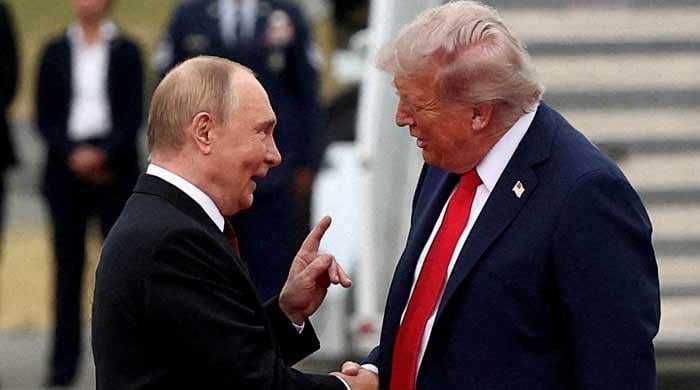
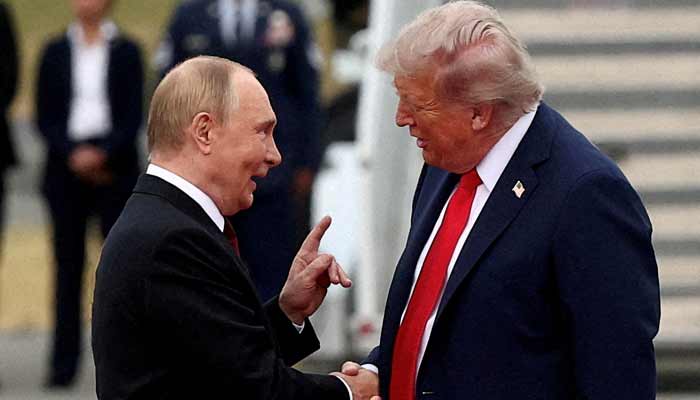
- Trump says Putin agrees to another summit.
- US president has telephonic conversation with Putin.
- Ukraine’s Zelenskiy to visit Oval Office tomorrow.
US President Donald Trump said he and Russian President Vladimir Putin agreed on Thursday to another summit to discuss ending the war in Ukraine, one day before the US president was due to speak with Ukrainian leader Volodymyr Zelenskiy.
Trump said he and Putin would soon meet in Budapest after a more than two-hour-long phone call he described as productive. The Kremlin did not immediately comment.
The surprise development came as Zelenskiy was headed to the White House on Friday to push for more military support, including potential long-range offensive missiles.
Yet the positive tone following the US-Russia call appeared to leave in question the possibility of such support in the near term.
Energy systems targeted
Kyiv and Moscow have been escalating their war with massive attacks on energy infrastructure while Nato struggles to respond to a spate of Russian air incursions.
The Trump-Putin meeting will follow lower-level talks between Moscow and Washington next week, Trump said. No date was provided for the leaders’ meeting.
In a post on Truth Social, Trump said he would brief Zelenskiy on the Russia talks in the Oval Office tomorrow.
“I believe great progress was made with today’s telephone conversation,” he added.
Ukraine wants to expand attack range
Ukraine has been seeking US Tomahawk long-range missiles, which would put Moscow and other major Russian cities within range of missile fire from Ukraine.
Trump, a Republican who has vowed to end the war that Russia started with its invasion of Ukraine in 2022, had before Thursday expressed increasing frustration with Putin over ongoing attacks.
Trump has said he could supply the long-range weapons to Ukraine if Putin fails to come to the negotiating table.
In its latest barrage, Russia launched more than 300 drones and 37 missiles to target infrastructure across Ukraine in overnight attacks on Thursday, Zelenskiy said. Kyiv has ramped up its own attacks on Russian targets, including an oil refinery in the Saratov region on Thursday.
Russia has been hitting Ukraine’s energy and power facilities for consecutive winters as the war drags into its fourth year.
In the latest warnings to Russia, Trump said on Wednesday that Indian Prime Minister Narendra Modi had pledged to stop buying oil from Russia, and that the administration would push China to do the same.
India has not confirmed any such commitment, though Reuters reported some Indian refiners are preparing to cut Russian oil imports, with expectations of a gradual reduction, three sources familiar with the matter told Reuters.
Defense Secretary Pete Hegseth said on Wednesday that Washington would “impose costs on Russia for its continued aggression” unless the war ends.
Politics
Shark mauls boy in Sydney Harbour


A shark mauled a boy swimming in Sydney Harbour on Sunday, leaving him in a critical condition with serious leg injuries, authorities said.
The predator bit the boy, believed to be about 13 years old, during the late afternoon off Shark Beach, New South Wales state police said.
“The injuries are consistent with what is believed to have been a large shark,” police said in a statement.
Officers pulled the boy from the water off the harbour beach within minutes of being alerted to the incident, police said.
They gave the boy first aid for “serious” leg injuries while he was aboard a police boat, applying two medical tourniquets.
Paramedics transported him to Sydney Children´s Hospital, where he was said to be in a critical condition.
“Swimmers are advised to avoid entering nearby waters at this time,” police said.
Shark Beach, in Sydney´s eastern suburb of Vaucluse, was closed and police evacuated nearby beaches in the harbour, the state government said.
Wildlife experts were working to identify the shark species involved, it said in a statement.
“This is a tragic shark attack on a young boy having a swim on a Sunday afternoon near a harbour beach in Sydney´s east,” New South Wales Agriculture Minister Tara Moriarty said.
“Our thoughts are with the young boy and his family. I understand there were also other young people with him at the time of the attack, our thoughts are also with them.”
There have been more than 1,280 shark incidents around Australia since 1791, of which more than 250 resulted in death, according to a database of the predators´ encounters with humans.
Increasingly crowded waters and rising ocean temperatures that appear to be swaying sharks´ migratory patterns may be contributing to a rise in attacks despite overfishing depleting some species, scientists say.
A great white shark mauled surfer Mercury Psillakis to death at a popular northern Sydney ocean beach in September.
Two months later, a bull shark killed a woman swimming off a remote beach north of Sydney.
Politics
Trump announces 10% tariffs on eight European nations over Greenland

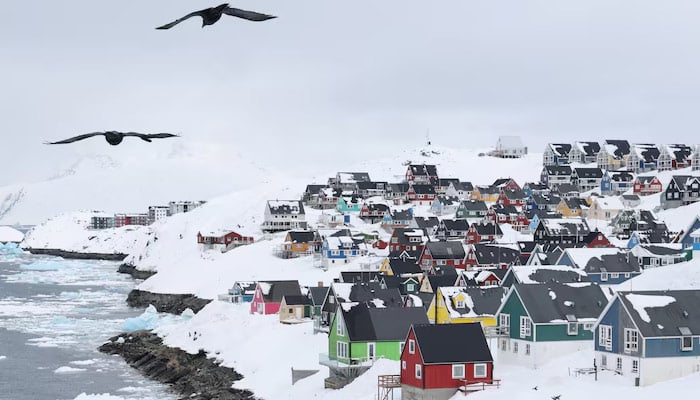
- Tariffs will stay until US buys Greenland: Trump.
- European nations reiterate support for Denmark.
- UK PM Starmer terms US move “completely wrong”.
US President Donald Trump on Saturday vowed to implement a wave of increasing tariffs on European allies until the Washington is allowed to buy Greenland, escalating a row over the future of Denmark’s vast Arctic island.
In a post on Truth Social, Trump said that an additional 10% import tariffs would take effect on February 1 on goods from Denmark, Norway, Sweden, France, Germany, the Netherlands, Finland and Great Britain — all already subject to tariffs imposed by Trump.
Those tariffs would increase to 25% on June 1 and would continue until a deal was reached for the US to purchase Greenland, Trump wrote.
Trump has repeatedly insisted he will settle for nothing less than ownership of Greenland, an autonomous territory of Denmark. Leaders of both Denmark and Greenland have insisted the island is not for sale and does not want to be part of the US.
Security, minerals
The president has repeatedly said Greenland is vital to US security because of its strategic location and large mineral deposits, and has not ruled out using force to take it. European nations this week sent military personnel to the island at Denmark’s request.
“These Countries, who are playing this very dangerous game, have put a level of risk in play that is not tenable or sustainable,” Trump wrote.
Protesters in Denmark and Greenland demonstrated on Saturday against Trump’s demands and called for the territory to be left to determine its own future.
The countries named by Trump on Saturday have backed Denmark, warning that the US military seizure of a territory in NATO could collapse the military alliance that Washington leads.
“The president’s announcement comes as a surprise,” Denmark’s Foreign Minister Lars Lokke Rasmussen said in a statement.
British Prime Minister Keir Starmer was unusually blunt in condemning Trump’s threat, saying on X that his country would raise the issue directly with Washington.
“Applying tariffs on allies for pursuing the collective security of Nato allies is completely wrong,” Starmer said.
European Commission President Ursula von der Leyen and European Council President Antonio Costa said in separate but identical posts on X that the European Union stood in “full solidarity” with Denmark and Greenland.
“Tariffs would undermine transatlantic relations and risk a dangerous downward spiral. Europe will remain united, coordinated, and committed to upholding its sovereignty,” they said.
Officials from Norway, Sweden, France and Germany reiterated support for Denmark on Saturday and said tariffs should not be part of Greenland discussions.
Cyprus, which currently holds the EU presidency, said it has called for an emergency meeting of ambassadors from the union’s 27 countries on Sunday.
Trade deals under threat?
Saturday’s threat could derail tentative deals Trump struck last year with the European Union and Great Britain. The deals included baseline levies of 15% on imports from Europe and 10% on most British goods.
“The biggest danger, it seems to me, is his decision to treat some EU countries differently from others,” said William Reinsch, a trade expert at the Centre for Strategic and International Studies. “I’m not surprised [….] It may well convince the European Parliament that it is pointless to approve the trade agreement with the US, since Trump is already bypassing it.”
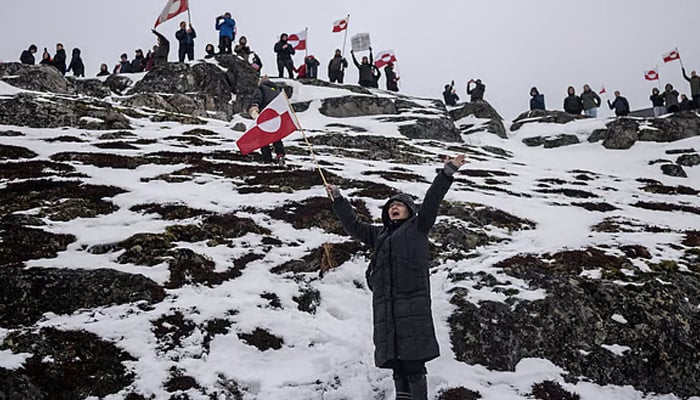
Trump floated the general idea of tariffs over Greenland on Friday, without citing a legal basis for doing so. Tariffs have become his weapon of choice in seeking to compel American adversaries and allies alike to meet his demands.
He said this week he would put 25% tariffs on any country trading with Iran as that country suppressed anti-government protests, though there has been no official documentation from the White House of the policy on its website, nor information about the legal authority Trump would use.
The US Supreme Court has heard arguments on the legality of Trump’s sweeping tariffs, and any decision by the top US judicial body would have major implications on the global economy and US presidential powers.
The encroaching presence of China and Russia makes Greenland vital to US security interests, Trump has said. Danish and other European officials have pointed out that Greenland is already covered by NATO’s collective security pact.
A US military base, Pituffik Space Base, is already in Greenland, with around 200 personnel, and a 1951 agreement allows the US to deploy as many forces as it wants in the Danish territory.
That has led many European officials to conclude that Trump is motivated more by a desire to expand US territory than by security concerns.
“China and Russia must be having a field day. They are the ones who benefit from divisions among allies,” EU foreign policy chief Kaja Kallas said on X in response to Trump’s threat.
Some US senators also pushed back. “Continuing down this path is bad for America, bad for American businesses and bad for America’s allies,” Senators Jeanne Shaheen and Thom Tillis, bipartisan co-chairs of the Senate Nato Observer Group, said in a statement.
Europeans should not react hastily to Trump’s tariff threat, said Carsten Brzeski, global head of macro at ING Research.
“Just ignore it and wait and see,” Brzeski told Reuters. “Europe has shown that it will not accept everything, and so the tariffs are actually already a step forward compared to the threatened military invasion.”
Politics
Indonesian authorities find wreckage of missing surveillance plane with 11 on board
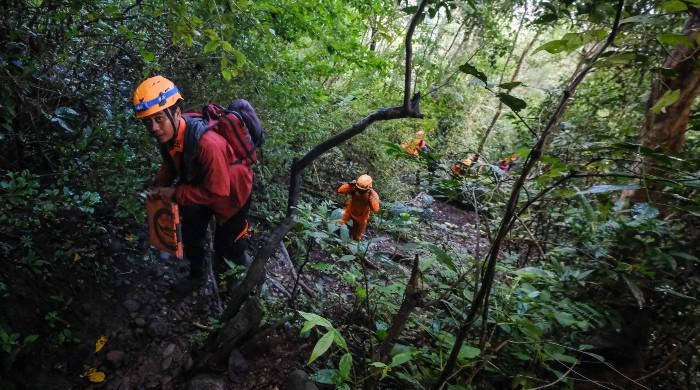
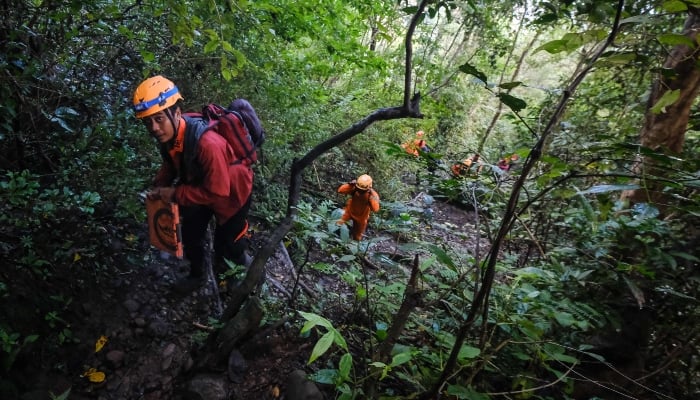
- Eight crew members and three passengers were onboard.
- Plane was chartered for fisheries surveillance operations.
- Debris found around Mount Bulusaraung amid heavy fog.
Indonesian authorities said on Sunday they had located the wreckage of a fisheries surveillance plane that went missing in South Sulawesi province near a fog-covered mountain, but were still searching for the 11 people on board.
The ATR 42-500 turboprop owned by aviation group Indonesia Air Transport lost contact with air traffic control on Saturday at about 1:30pm local time (0530 GMT) around the Maros region in South Sulawesi.
There were eight crew members and three passengers on board the plane, which was chartered by Indonesia’s Marine Affairs and Fisheries Ministry to conduct air surveillance on fisheries. The passengers were ministry staff members.
The head of South Sulawesi’s rescue agency, Muhammad Arif Anwar, said on local television that after finding the wreckage, the rescuers would deploy 1,200 personnel to search for the missing passengers and crew.
“Our priority is to search for the victims, and we hope that there are some that we can evacuate safely,” he said.
The aircraft had been heading to Makassar, the capital of South Sulawesi, after departing from Yogyakarta province, before contact was lost.
On Sunday morning, local rescuers found the wreckage in different locations around Mount Bulusaraung in the Maros region, said Andi Sultan, an official at South Sulawesi’s rescue agency. The mountain is roughly 1,500 km (930 miles) northeast of the sprawling island nation’s capital, Jakarta.
“Our helicopter crews have seen the debris of the plane’s window at 7:46am,” Sultan told reporters.
“And around 7:49am, we discovered large parts of the aircraft, suspected to be the fuselage of the plane,” he said, adding the tail of the plane was also seen at the bottom of the mountain slope.
Rescuers have been deployed to the locations where the wreckage was discovered, Sultan said, adding the search was hampered by thick fog and mountainous terrain.
In video footage shared by the rescue agency, a window of the plane was found scattered on the mountain with thick fog and strong wind around it.
Sultan said Indonesia’s National Transportation Safety Committee would lead an investigation into the crash. The cause remains unclear, and experts say most accidents are caused by a combination of factors.
The ATR 42‑500, manufactured by Franco-Italian planemaker ATR, is a regional turboprop aircraft capable of carrying between 42 and 50 passengers.
Flight tracking website Flightradar24 said on X that the plane was flying over the ocean at a low altitude so its tracking coverage was limited, and the last signal was received at 0420 GMT about 20 km northeast of Makassar airport.
-

 Tech5 days ago
Tech5 days agoNew Proposed Legislation Would Let Self-Driving Cars Operate in New York State
-

 Sports1 week ago
Sports1 week agoClock is ticking for Frank at Spurs, with dwindling evidence he deserves extra time
-
Sports1 week ago
Commanders go young, promote David Blough to be offensive coordinator
-

 Entertainment5 days ago
Entertainment5 days agoX (formerly Twitter) recovers after brief global outage affects thousands
-

 Fashion1 week ago
Fashion1 week agoSouth India cotton yarn gains but market unease over US tariff fears
-

 Fashion1 week ago
Fashion1 week agoChina’s central bank conducts $157-bn outright reverse repo operation
-

 Business1 week ago
Business1 week agoSoftBank reduces Ola Electric stake to 13.5% from 15.6% – The Times of India
-

 Sports1 week ago
Sports1 week agoUS figure skating power couple makes history with record breaking seventh national championship






